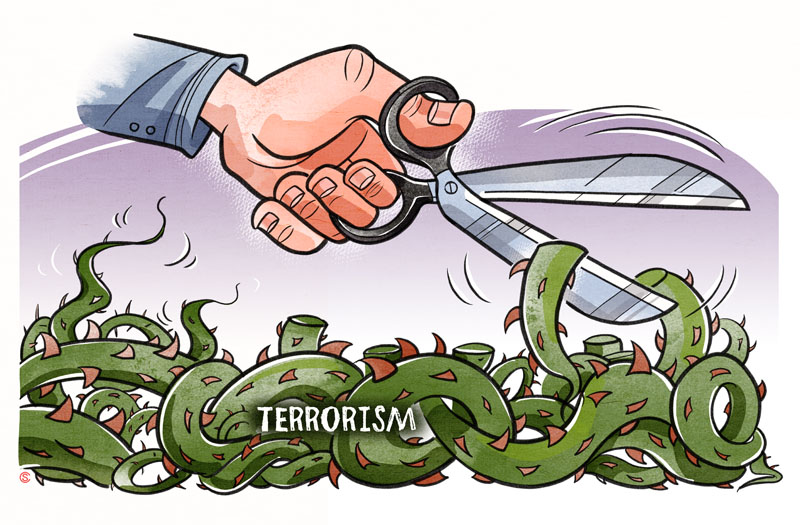IS leader's death doesn't reduce terror threat
By Liu Jianna | China Daily | Updated: 2019-10-30 07:04

Editor's Note: The United States announced on Sunday that Islamic State leader Abu Bakr al-Baghdadi was killed in a US raid in Syria on Saturday. How will this affect US politics and the security situation in the Middle East? Two experts share their views on the issue with China Daily's Liu Jianna. Excerpts follow:
US leader grasps at the proverbial straw
The somewhat dramatic killing of al-Baghdadi is nothing less than the proverbial straw the US leader has grasped at a time when Democrats and some Republicans have opposed his decision to withdraw US troops from Syria and the process to impeach him is gathering pace.
The killing of al-Baghdadi has given the US leader an opportunity to showcase his achievements against the background of US domestic political struggle becoming increasing fierce. But despite the death of al-Baghdadi dealing a blow to the IS outfit, terrorist groups are still active even as the Taliban are engaged in talks with multiple parties including the US.
More disconcertingly, the fact that the IS group had its own "territory", financial resources, oil fields and even its own currency during its heyday means the threat from the remaining IS terrorists is not over. And this threat must not be treated lightly.
It would be fair to say the Middle East policies of both Barack Obama and his successor in the White House have not been effective to the extent needed, although the incumbent US president is receiving more criticism. This is mainly because contradictions abound in the Middle East, although the White House's more audacious and risky approach to regional conflicts, including its obvious favoritism toward Israel and moving the US embassy in Israel from Tel Aviv to Jerusalem, is certain to be rejected by people in the Middle East and beyond.
Nonetheless, the death of the IS leader has given the US leader much to taunt about. And given his high profile publicity of the incident, we know the opportunity to promote himself is not lost on him.
Development key to fight terrorism
It is hard to say how heavy a blow the death of al-Baghdadi will deal to the IS, especially because it has withered as a terrorist outfit since its heyday and its morale is already low. Some claim al-Baghdadi's death could create a division in the group, which seems unlikely as the priority for the IS now is to survive, and internal conflicts would put the survival of the outfit at risk.
And although the IS leader's killing will boost counter-terrorism efforts in the region, the key to contain terrorism in the Middle East is to take precautionary measures and reduce the factors that give rise to terrorism, such as poverty, social ills, political unrest and lack of development.
That the emergence of the IS coincided with the renewed social upheaval in Iraq and Syria and the unrest in Iraq and Egypt due to unsatisfactory reform should prompt those countries to make extensive efforts to ensure social stability, improve governance and let people enjoy the fruits of economic development. Which means development should be made the first priority to effectively root out terrorism.
It is encouraging to see some Middle East countries realizing the futility and harm of engaging in regional conflicts such as the civil war in Yemen that was instigated by major countries, including the US, with ill intentions, and understanding that development should be eventually made the first priority.
In fact, the US' Middle East policy, to some extent, is responsible for creating the current chaos. By supporting anti-government forces in some countries, apparently to initiate regime change, the US has sowed the seed of turbulence in those countries. Many observers even say that the US' interference in Iraq and Syria is squarely to blame for the establishment and rise of IS. So, if the US wants to contribute to regional peace and stability, it should correct its wrongs and change its policies.
Still, its achievements in countering terrorism including taking out Osama bin Laden and al-Baghdadi should be applauded.
Tao Wenzhao, a researcher in US studies at the Chinese Academy of Social Sciences
Li Weijian, a senior research fellow at the Center for West Asian and African Studies, and the Institute for Foreign Policy Studies, Shanghai Institutes for International Studies
The views do not necessarily represent those of China Daily.
























